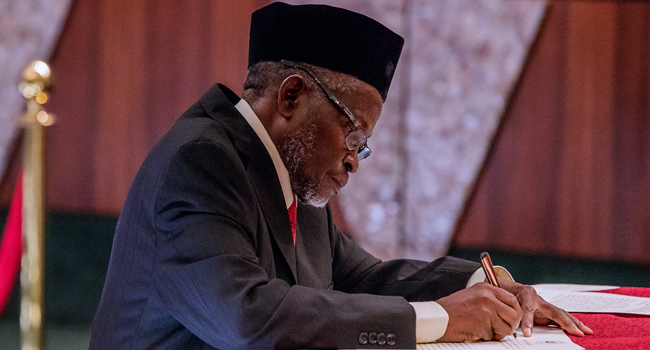This post has already been read 1777 times!
• Drama as Onnoghen accuses FG of tampering with assets forms
Justice Tanko Muhammad has said that President Muhammadu Buhari does not require the permission of the National Judicial Council (NJC) to appoint him as acting Chief Justice of Nigeria (CJN). He also said he was not aware CJN Walter Onnoghen was suspended before he (Tanko) was sworn in.
He stated this while responding to a query by the NJC.
The query followed a petition by a group, Centre for Justice and Peace Initiative, which asked the NJC to strip him of his role as a justice of the Supreme Court for accepting the position of acting CJN without the council’s nod.
He said: “In my respectful view, the National Judicial Council has no role to play in the appointment of an acting Chief Justice of Nigeria in the first instance, that is to say on first appointment. The council comes in where the appointment as the acting CJN is to be renewed or extended. I humbly refer to Section 231(4) of the 1999 Constitution.
He said further: “On January 25, 2019, I was summoned to the Aso Villa at the instance of the president. Prior to the summons, I was not aware of the fact that the Code of Conduct Tribunal (CCT) made any order on January 23, 2019. Furthermore, beyond what I read in the newspapers and watched on the television, just like any other Nigerian, I was not privileged to see any of the processes filed by the parties before the tribunal. Hence, I could not really appreciate the merit or demerit of divergent positions.
“On the 25th day of January, the president swore me in as the acting CJN and not as the substantive CJN. Justice Walter Onnoghen remains the CJN until he is removed from office in accordance with the provision of the constitution. He is only suspended.”
Some legal practitioners however have disagreed with Tanko. Lagos-based lawyer, Anthony Omaghomi, said: “I personally think it is a very lame defence. I find it unacceptable. There is no such distinction in the constitution.”
Abuja-based lawyer, Abubakar Sani, said: “Under the Interpretation Act, the president can only appoint an acting judge on the same terms as a substantive judge, that is on the recommendation of the NJC and subject to the approval of the Senate.”
But the executive director, Socio-Economic Right and Accountability Project (SERAP), Adetokunbo Mumuni, held a divergent view. “It is as simple as that. It is only when such appointment needs to be made substantive that the NJC would be involved,” he said.
Onnoghen meanwhile has alleged that agents of the Federal Government tampered with his Assets Declaration Forms submitted to the Code of Conduct Bureau (CCB).
He made the claim at his resumed trial yesterday at the CCT.
The said documents include CCB Assets Declaration Forms of 2014 and 2015.
The first prosecution witness, James Akpalla, a senior investigative officer with the CCB, sought to tender the said documents in support of his evidence against Onnoghen during yesterday’s proceedings.
When the documents were shown to the defendant, however, Onnoghen, through his counsel, Chief Adegboyega Awomolo, told the tribunal that a careful look at them showed that they had been tampered with.
According to him, the 2014 form “has become loose, part of it mutilated and has become blue in a way.”
Awomolo stated that a similar observation was made in the 2015 form with duplications and omissions of some pages. “We have some reservations on the documents. We will not object in the interest of justice but we have reservations that would be addressed at the end of the day,” he said.
Akpalla, in his evidence in chief, told the tribunal that the CCB on January 10 referred a petition written by the Anti-Corruption and Research Database Initiative to his team for investigation.
The witness added that on the strength of the petition signed by one Chief Dennis Aghanya, he visited Onnoghen in his office at the Supreme Court, where a cautionary statement was obtained from him, while letters were also written to the Standard Chartered Bank for account details of the defendant with the bank.
He further held that the following day, January 11, the bank responded, prompting the investigating team to conclude their enquiry and prepare their report.
Under cross examination, the witness informed the tribunal that he did not know whether the CCB has a central registry and register where returned assets forms are deposited and registered.
While responding to another question, the witness told the tribunal that investigation into the petition against Onnoghen was concluded within 24 hours.
Drama however ensued when Awomolo confronted the witness with the charge against Onnoghen, proof of evidence, list of exhibits and witnesses, which were all dated January 10, when investigation into the petition had not been completed.
Also, when the witness attempted to deny the involvement of the Economic and Financial Crimes Commission (EFCC) in the CCB investigation, Awomolo confronted him with yet another set of documents from Standard Chartered Bank addressed to the EFCC but tendered by the witness.
In the course of the proceedings, the petition against Onnoghen, two documents from his bank, his cautionary statement and the two assets declaration forms he once submitted to the CCB were admitted as exhibits by the tribunal.
Meanwhile, hearing on the matter has been adjourned till March 21.
It is expected that on that adjourned date, the account officer to Onnoghen, already summoned by the tribunal, will appear in relation to the documents submitted to the CCB.
Prosecution counsel, Aliyu Umar, had earlier asked the court to subpoena the bank official after Awomolo had opposed tendering the bank document on the ground that since the witness did not author or sign the document, he could not tender it as an exhibit before the tribunal.
[TheGuardian]



